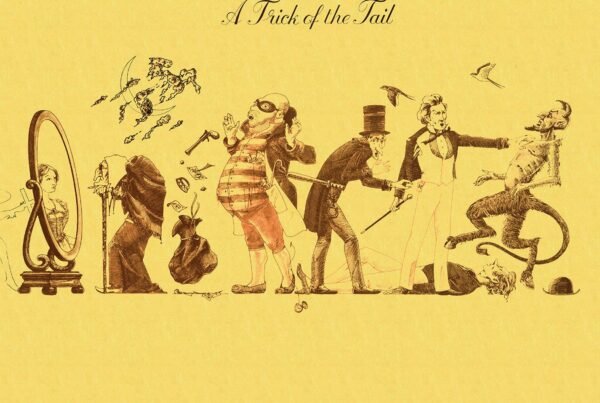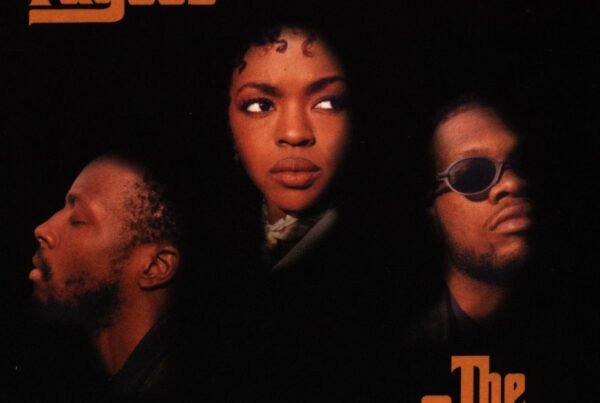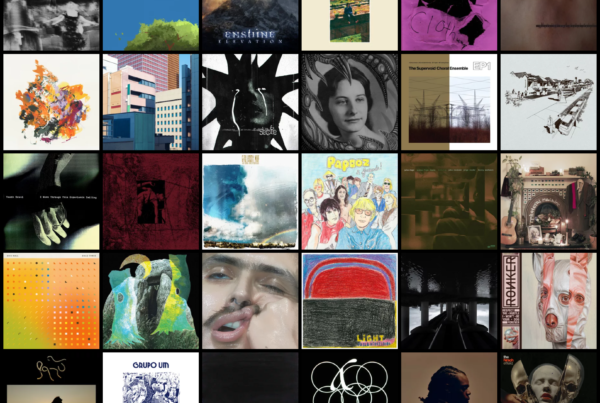Welcome everyone to another week of Review Rundown. You’ll notice it is looking a little sparse in here, and we’re running a little late this time around. Never fear – this feature isn’t disappearing anytime soon and we plan to be back on schedule every fortnight going forwards. We have eight bands for you today, covering a number of genres – Julian Lage, Motorpsycho, Regarding Ambiguity, Surroundings, Black Matter Device, Little Simz, Gesaffelstein, and Dominique Fils-Aimé.
Take a look at previous editions here, perfect for rainy days when you want to consume new music!
David
Gesaffelstein was once set to be the preeminent name in dark and atmospheric techno with his 2013 album Aleph. Was.
With his newest album, Hyperion, it seems as though the French producer and DJ is more comfortable finding a square hole for his square peg, following trends a lot closer than he has before.
I feel like about half of this album has a hindering identity crisis. “Lost in the Fire” with The Weeknd sounds like something The Weeknd would be on, but it also sounds like something a number of other producers could (and should) have made for the sinful R&B crooner. “Blast Off” with Pharrell is fun, but, again, it’s hard to find the identifying factors and elements of Gesaffelstein’s work.
It’s not all bad. I see flecks of the missing-in-action dark side with “Reset”, a catchy, glitchy cyberpunkian affair that doesn’t go straight to the stereotypical synthwave sound. It’s multilayered and nice, distinctive of Gesaffelstein. His old spark is best heard on “Humanity Gone”, his longest track to date to my knowledge. Now, there’s some nice gloomy, suspenseful, expansive atmosphere!
I don’t expect, nor want, artists to stagnate and repeat the same winning formulas over and over without change. Gesaffelstein can do whatever the hell he wants! Regardless, it’s quite disappointing to see an artist with a lot of substance and talent move into fields where they may succeed, but lose their unique spark. I’m sorry to say this album was a pretty big letdown.
‘I said it with my chest and I don’t care who I offend!’
This is the kind of energy Little Simz brings on her newest album. By my accounts, she’s a woefully slept on rapper, but GREY Area grasps you by the collar with smooth instrumentation, affecting storytelling, and bars for days.
The English rapper navigates an increasingly crowded jazzy rap landscape with a confidence I personally haven’t seen since Ghostface linked up with BADBADNOTGOOD. Even still, there’s a time for vulnerability and soul. This is when we see Simz the person, and the life she’s lived; her passionate portrayal and testimony of life as a black woman, her trials with love, and of friends who got wrapped up in a world of peer pressure and violence. The storytelling here is deft and impressive, especially on tracks like “Wounds” and “Sherbet Sunset”, the latter of which is an emotional purge based on love lost. It makes for a very warm, personal, and intimate endeavor, the kind that regularly gets critical praise when executed well, but is rarely made by artists.
The hardest tracks on here are “Boss”, “Venom”, and “101 FM”. The last two have the tightest flows on the whole album, carrying the snappy, patois-laced diction that would make Dizzee Rascal or Skepta proud while flourishing strings, poking synths, and bold drums assist.
With well-used features rounding out the full-bodied sound, GREY Area is the best hip-hop record of 2019 so far. Full stop.
Spencer
Black Matter Device – Hostile Architecture
Fredericksburg, VA’s very own Black Matter Device are a violent, aggressive outfit. They shove their way into the scene and demand your attention, and they have earned it. Hostile Architecture is a brutally fun album. It is energetic and vigorous. There is no holding back, which gives this release an aura of life unseen in many other extreme hardcore outfits.
The chaotic and energetic sound that Black Matter Device bring got me hooked immediately. “Hurricane Pornography” starts the album with a raw, nearly unfiltered tone that is reminiscent of a grindcore album. The shrieks from the guitars and harsh screaming is there, but it is toned back to be a more cohesive unit compared to that of a grindcore record.
The album is also very short. There is only about twelve minutes divided amongst seven songs. I do believe this works in its favor, however, as there is no dead space to any of the tracks. Every second is meaningful and full of spunk. If we take “Energy Efficient Gay Emissions”, which is the shortest track on the album, it is a non-stop, no-holds-barred experience. There is no excess and no real reason for it to be any longer. It’s tracks like these that make this album special and will keep on a loop for me for some time.
Now, if you’ll excuse me, I need to go break some stuff.
I’ll be one of the first to say that oversaturation of bands in the metalcore genre is reaching an all-time high. This is also coming from someone who, during most of my late high school and early college days, listened to nothing but metalcore. So upon my first listen to Surroundings, I was at first getting what I had expected from it. I can honestly say, however, that with further listens I actually really did start to enjoy this release. Is it another pretty standard metalcore release? Absolutely. Is it awful, unoriginal, and deserve to be burned at the stake? Absolutely not.
I think the thing I like about Glass Heart is that, while it does follow the traditional musical patterns of its peers, there is a lot of, forgive the pun, heart to be found here. I can feel the emotional distress in many of the songs. Tracks such as “Burnt Pages” and “Jane” have near palpable motifs that at times gave me some goosebumps. The lyrical concepts throughout the record are deep and worthy of study. It really helps set Surroundings apart from others in their genre companions.
I know I’ve gotten flack before for insinuating that bands have to constantly be pushing the envelope to be considered good. Let Glass Heart put on record that standard does not mean bad; predictable is not a death sentence. As long as a band can take a formula and try to make it their own and put their every effort into it, then it can be winner.
Tim
In the last few years, one of my favorite genres was revived: screamo or skramz. One example to show just how alive and kicking the genre is, would be Regarding Ambiguity, a band that excels at creating emotional music with blackened atmospheres, serene scream and a duality between melancholy and euphoria. Flayed presents itself, just like the parrot on the cover, as an organic, colorful piece of music.
The first track “Movie Kiss” starts out with a jangly riff, soon to be turned into a melodic lead line under an onslaught of fast chords, blast beats, and vocal cord shattering screams. A bit like a mix of Pageninetynine and Alcest, the band builds a sound that is both a bit depressing, yet uplifting in its composition. Comparing them to other projects doesn’t do them justice, though, as they carve out their own niche in this short, but memorable record.
“Arrows” shows just how creative the band can be, with natural harmonics woven into the riffs to give them an angelic appeal, while the drum thrashes and stomps in all its violent, audible glory. A few diminished lead notes and a blast section later, we land all the way at the bottom of a cave so filled with echoes and reverb, it drowns out all thought. This clean section is simple yet so effective, I had goosebumps just listening to it play out. A marvelous record from a promising band.
Ah, Norway. A land where progressive ideas seem to flow like water. In this episode of another good band from the north, we have Motorpsycho as our guest. Don’t be deceived by the name, Motorpsycho don’t play harrowing death metal or industrial. No, they play progressive rock of the best kind. The first track from The Crucible illustrates my point, mixing a 70s prog vocal style with punky, chromatic riffs and evolving songs.
The creatively named “Psychotzar”, blends the guitar heavily with the bass, creating a thick front for their riffage. But as the song progresses, a Hammond organ joins the trio of guitar, bass and drums, bringing in some mellow atmospheres to the grime. Little embellishments like a gong, detuned synths, and octave effects make for an interesting experience that can easily hold your interest for its full eight minutes and 43 seconds.
“Lux Aeterna” on the other hand, comes forth with a folk intro, including harmonized vocals and oboe. This quickly culminates in the oboe taking the role of lead instrument, putting sugar atop everything. Of course, the thick bass and some guitar can’t be missing from a Motorpsycho song, so a dissonant, chaotic solo in the middle breaks the dramatic rock opera. Even though The Crucible only offers three songs, the sheer quality of them makes me want to recommend the record to absolutely anyone who wants to hear it. This is modern prog rock at its most lovable and admirable.
Pete
Julian Lage sports an impressive résumé, with a career spanning since his eighth year on the planet. Love Hurts adds to a burgeoning record collection, containing 43 minutes of high-quality jazz guitar music. Throughout the record, Lage shows off his incredible guitar skills, and it is understandable why so many revere him as a prodigy. The tones are gorgeous, and each song sounds unique, which itself is a feat when playing instrumental jazz with minimal instrumentation.
However, the guitar isn’t the only impressive instrument on the album – the drums also play a key role in making Love Hurts what it is. On tracks like “Encore (A)”, the drums not only open the track, but hold it together nicely as Lage‘s guitar disappears off on tangents. The double-bass also drives the conversation, and in “Tomorrow Is The Question”, you’ll hear both instruments fighting for spotlight against the lead guitar.
Some songs get you grooving, whilst others create a more mellow mood. At times walking down the street, I felt as though I was in a Twin Peaks episode, the jazz playful but dreamy. As you traverse the rich soundscapes of Love Hurts you’ll hear all sorts of styles, from more frantic free-jazz to organised, romantic songs. It is yet another fine feather in the cap of Julian Lage, and worth any jazz fans while.
Dominique Fils-Aimé – Stay Tuned!
Nameless, the 2018 release from Dominique Fils-Aimé grabbed my attention due to its innovative songwriting and her fantastic voice. Stay Tuned! pushes the boundaries further, with a multitude of genres covered in the backing music, held together by the soulful vocals. It is an incredibly rich experience, and one to be experienced loud so you can hear the full excellence of the backing music. In the press release for the album, Dominique Fils-Aimé expressed a desire to move beyond musical conventions, and that promise is certainly delivered. Often throughout the record, I’ve found myself slightly confused, but otherwise amazed at the unique song structures, which combine elements of jazz, world, and soul together in an off-kilter fusion that works perfectly.
Some of the songs are really short, but work as powerful reminders of how great Dominique Fils-Aimé‘s voice is. “Good Feeling” which opens the album is full of energy and “Stay Tuned!” which close it out showcases the rich tones she can produce. Some songs like “Where There Is Smoke” feature limited instrumentation and focus on using backing vocals, claps, and drums to create quite an oppressive atmosphere, coupled with the melancholic vocals.
From start to finish, there is a song for everyone to enjoy. That being said, you might not like every single one due to the staggering shifts in style. Love Hurts is a work of art in more ways than one, and sets Dominique Fils-Aimé apart from other vocalists. Make sure to experience this.






